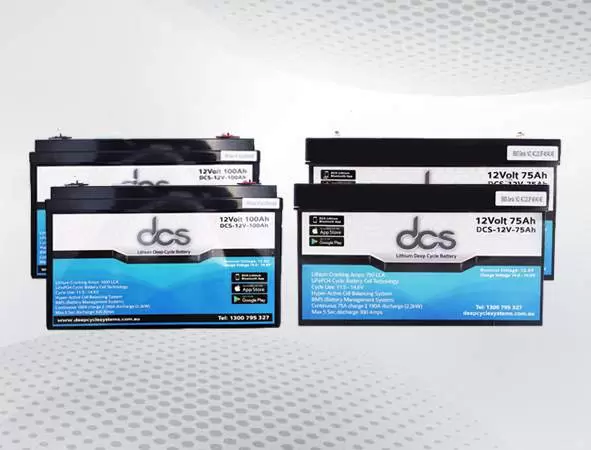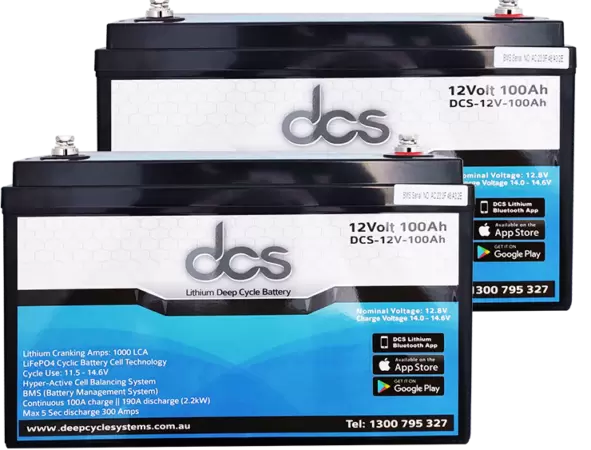Choosing the right High Capacity Deep Cycle Battery can be a daunting task. With so many options available, it can be hard to know which type of battery fits your needs best. We’ve created this guide to help you determine which deep-cycle battery is the right choice for your application. We’ll discuss the features and benefits of different deep-cycle batteries and provide tips on how to make the best selection for your specific requirements. Whether you’re using a deep cycle battery to power a motorhome, an RV, or other applications, this guide will help you make an informed decision.
What is Maintenance Free Deep Cycle Battery?
A Maintenance Free Deep Cycle Battery is a type of battery that is designed to be low-maintenance, meaning it requires very little upkeep. Unlike traditional lead-acid batteries that need regular water top-up and acid level checks, maintenance-free deep-cycle batteries are sealed and don’t require any additional water. They are designed to provide long-lasting power for applications such as off-grid solar power systems, RVs, boats, and electric vehicles. These batteries use advanced technology that prevents sulfation and corrosion, which can damage the battery and reduce its overall lifespan.
Maintenance-free deep-cycle batteries come in various sizes and types, such as flooded lead-acid, sealed lead-acid, and lithium-ion batteries. Each type has unique advantages and disadvantages, so choosing the right type that suits your specific application needs is essential. Overall, a maintenance-free deep cycle battery is a reliable and durable power source that requires little to no maintenance, making it an excellent choice for many applications.
Types of 12v Deep Cycle Battery Amp Hours
When choosing a high-capacity deep cycle battery, the amp hours are one of the most important factors. This measurement refers to the amount of current a battery can deliver over a specified period.
Several types of 12v Deep Cycle Battery Amp Hours is available on the market, each with a different amp hour rating. These include:
- Flooded lead-acid batteries – These are the most commonly used deep cycle batteries with an amp hour range of 50 to 400.
- Sealed lead-acid batteries are similar to flooded batteries but are maintenance-free and have a slightly lower amp hour range, typically between 30 and 200.
- Gel batteries – These use a thick gel electrolyte instead of liquid, making them more durable and vibration-resistant. They have an amp hour range between 30 and 400.
- Lithium-ion batteries are the most advanced and efficient deep cycle batteries, with an amp hour range from 20 to 300.
When choosing a high-capacity deep cycle battery, it’s important to select the right amp hour rating based on your specific energy needs. Factors like the size of your solar panels, the amount of energy you consume, and the length of time you plan to be off-grid all play a role in determining the appropriate amp-hour rating for your battery.
Considerations for Choosing the Right Deep Cycle Battery For Solar Storage
When it comes to off-grid solar storage, choosing the right Deep Cycle Battery For Solar Storage is crucial to ensure a reliable power supply. Here are some key considerations to keep in mind when selecting your battery:
- Battery Type: There are different types of deep cycle batteries available in the market, such as flooded lead-acid, sealed lead-acid, and lithium-ion batteries. Each has its own set of pros and cons. Sealed lead-acid batteries, for example, require less maintenance, while lithium-ion batteries offer high energy density and longer lifespan. Consider which type suits your needs and budget the best.
- Battery Capacity: Battery capacity refers to the energy a battery can store and provide. The higher the capacity, the longer your battery can sustain off-grid power needs. Take note of the amp-hour (Ah) rating of the battery. Use a high-capacity battery using power-hungry appliances like a refrigerator or air conditioner.
- Cycle Life: Cycle life refers to the number of times a battery can be charged and discharged before it loses capacity. It is essential for solar storage applications where the battery undergoes frequent charge-discharge cycles. Choose a battery with a longer cycle life to get the most value for your investment.
- Temperature Range: The battery’s operating temperature range is another crucial consideration. Extreme temperature changes can affect the battery’s performance and lifespan. Make sure to choose a battery that can handle the temperature fluctuations of your location.
 Maintaining and Caring for Your High Amp Hour Deep Cycle Battery
Maintaining and Caring for Your High Amp Hour Deep Cycle Battery
Your high amp hour deep cycle battery is a critical component of your solar storage system, and it’s important to maintain and care for it properly to ensure it continues to perform at its best. Here are some tips to help you keep your battery in good condition:
- Charge the battery properly: Follow the manufacturer’s charging recommendations. Overcharging or undercharging can reduce the battery’s lifespan and performance.
- Monitor the battery’s charge level: Check the battery’s charge level regularly, especially during heavy usage periods. If the battery falls below a certain threshold, it can become damaged or fail.
- Keep the battery clean: Regularly clean its terminals and surrounding area to prevent dirt, debris, and corrosion from affecting its performance.
- Store the battery properly: If you need to store it for an extended period, keep it in a cool, dry location and ensure it’s charged to at least 50% before storage.
- Avoid deep discharge: Deeply discharging your battery can damage and reduce lifespan. Avoid discharging it below 50% capacity, and consider installing a low-voltage disconnect to prevent deep discharge.
Assessing Off Grid Solar Battery Systems Durability
When choosing a high-capacity deep cycle battery for Off Grid Solar Battery Systems, durability is essential. After all, your battery must withstand all sorts of weather conditions and still deliver reliable energy when needed. Here are a few key things to look for when assessing the durability of an off-grid solar battery system:
- Construction quality: Your battery should have high-quality materials and construction techniques to withstand extreme temperatures, humidity, and other environmental factors.
- Warranty: Make sure the battery you choose comes with a warranty that covers any defects or damage caused by regular use.
- Testing: Look for batteries that have undergone rigorous testing and quality control procedures to ensure they can handle off-grid solar storage demands.
- Maintenance requirements: Some batteries require more maintenance than others, so choosing a system that fits your needs and capabilities is important. Lithium batteries, for example, generally require less maintenance than lead-acid batteries.
Maximizing Energy Conversion of Off Grid Lithium Battery
Choosing the right battery technology can make all the difference in energy conversion and overall system performance when it comes to off-grid solar battery systems. One type of high-capacity deep-cycle battery that is gaining popularity is lithium-ion. Here are some tips on how to maximize energy conversion of Off Grid Lithium Battery:
- Ensure Proper Charging Voltage: Lithium-ion batteries require a specific charging voltage for optimal performance and longevity. It is important to ensure that the charging system is set to the correct voltage and that the battery is not over or undercharged.
- Avoid Over-Discharging: Lithium-ion batteries should never be fully discharged as they can damage the battery and reduce lifespan. It is recommended to keep the battery charged to at least 20%.
- Install an Energy Management System: An energy management system can help monitor and optimize the performance of off-grid solar battery systems, including lithium-ion batteries. This system can track energy usage and ensure the battery is charged and discharged properly.
- Choose a High-Quality Battery: Not all lithium-ion batteries are created equal. Choosing a high-quality battery from a reputable manufacturer can ensure better energy conversion and longer lifespan.
Balancing Portability and Capacity of Off Grid Solar Battery Storage
One of the biggest challenges in choosing the right Off Grid Solar Battery Storage is balancing portability and capacity. A battery with a large capacity will provide more power and last longer but will be heavier and less portable. On the other hand, a lighter battery may be more mobile but may not provide enough power for longer periods of use.
When selecting a battery, it is important to consider how much power you will need and how frequently you will need to charge it. It will help you determine the battery’s capacity or the amount of energy it can store.
However, it is also important to consider the battery’s weight and size and how easily it can be transported and installed. It is essential if you plan to use your solar power system in remote locations or on the go.
To balance capacity and portability, consider a battery designed to be compact and lightweight but still offers high energy storage capacity. Lithium batteries are a good option, as they are often lighter and more compact than traditional lead-acid batteries but can still offer a high degree of energy storage.
Another option is to invest in a modular battery system, which allows you to add or remove batteries as needed to increase or decrease the capacity of your solar power system. It can allow you to customize your system to your specific needs and use it in various settings.
Ultimately, choosing the right off-grid solar battery storage will depend on your specific power needs, as well as your budget and mobility requirements. By considering both capacity and portability, you can find a battery that will provide reliable power without sacrificing mobility or convenience.
Conclusion
Choosing the right high-capacity deep-cycle battery for your solar storage needs is crucial to the success and efficiency of your off-grid solar system. By considering factors such as the type of battery, its amp hours, and durability, you can ensure that your battery can store and release energy efficiently and effectively.



